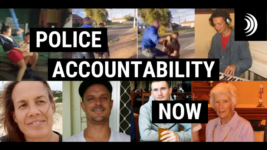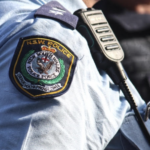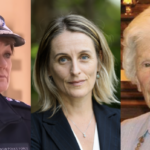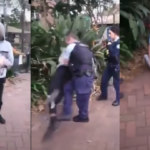Calls for a Royal Commission, as NSW Police Killing Spree Continues

A New South Wales police officer lethally tasered 95-year-old great-grandmother Clare Nowland, who suffered dementia, as she was approaching the officer holding a steak knife and using a walking frame to aid her. This incident, which took place in a Cooma nursing home, was reported globally.
And one would have thought following the 17 May 2023 tragedy that NSW Police Force management may have suggested pulling back on applying force in regard to people obviously having mental health episodes, especially as Nowland died as a result of police actions.
But instead, NSW police has gone on a killing spree targeting those having mental health crises ever since.
On the day following Nowland’s death in hospital, two officers shot a North Willoughby man, having what appears to have been a mental health episode on the street whilst he was carrying two knives. Four shots were fired by officers, without any attempt to use a taser first.
Rising calls for police reforms neither prevented officers called out for a mid-July welfare check that involved a Glebe man, who’d clearly been self-harming, from taking a deadly approach. One officer initially tasered Jesse Deacon, who was holding a knife, and then a second shot him dead.
And after yet another shooting death, this time of a woman suffering a mental health crisis last Thursday, calls are not only continuing for a NSW parliamentary inquiry into police use of force on vulnerable people, but now there are demands for a Royal Commission into all Australian police.
Fourth casualty in four months
NSW police were called upon to deal with a woman, who, on having just been served an eviction notice, produced an axe, allegedly threatened a real estate agent and began hitting a fence with the tool and screaming about her distress over this development.
Officers attending the scene at around 12.30 pm on 21 September claim 47-year-old Kristina Kach threatened them with the axe, before she barricaded herself inside her apartment, which led to a nine hour siege.
The family of the woman had warned police that she was in need of “medical help” and were told in response that she’d be attended to by medical professionals. And one of the woman’s daughters asked police if she could enter to talk to her mother prior to officers, but this request was denied.
However, once NSW police specialist tactical officers arrived on the scene, they entered the premises at 9.45 pm. And one officer shot Kach in the shoulder with a beanbag-style round, prior to another officer tasering the distressed woman.
Kach died in John Hunter Hospital that same evening as the nonlethal beanbag round punctured the woman’s body and struck her heart.
As per usual, NSW police will be conducting its own inquiry into Kach’s killing, as the sole independent state police watchdog, the Law Enforcement Conduct Commission (LECC), isn’t charged with investigating police critical incidents, but rather only oversights most of them.
Long denied reform
The issue with ill-trained police being relied upon as the first line of approach to mental health crises and welfare checks with often violent and deadly consequences, is a problem that’s existed since the NSW Police Force was established in 1862.
As NSW Greens MLC Dr Amanda Cohn told Sydney Criminal Lawyers three weeks back, alternatives to sending out armed officers in blue do exist. And these programs are already operating in other states, while the PACER program is being trialled in NSW.
Indeed, Cohn is chairing a parliamentary inquiry into NSW mental health service accessibility that will be deliberating upon the subject of alternatives to sending out police officers to take out people in crisis.
“Police officers are not mental health professionals,” the doctor made clear. “I’ve heard over and over again stories where the presence of police escalated the distress of a vulnerable person rather than deescalating the situation.”
But the issue that the NSW government, the NSW Police Force and the Police Association of NSW seem determined not to deal with is that officers are trained to apply force, whether that be physical or via the use of weapons, so that’s exactly what they do in these situations.
Just as the NSW Police Force was developed within a colony where First Nations people were considered the enemy, and thus systemic racism is incorporated into its structures, so too is the blatant disregard officers take to those having a mental health crisis ingrained in its foundations.
A nationwide investigation
“Under no circumstances should the NSW community have to accept police use of excessive force or police violence,” NSW Greens MCL Sue Higginson told SCL in May. “There are an alarming number of reports of police causing harm. We need to accept that we actually have a police problem in NSW.”
The NSW Greens justice spokesperson has also been calling on the state’s major parties to consider establishing an inquiry into the NSW Police Force itself, with a focus on how it approaches vulnerable people, as well as its use of excessive force.
But, as usual, the NSW major parties – Labor and the Liberals – aren’t interested in police reform.
The National Justice Project has long been calling out the excessive use of force by Australian police nationwide. This is especially so when it comes to the brutality that police officers take to First Nations people and the lack of regard shown to people having a mental health crisis.
NJP has been representing the McKenzie’s during the coronial inquiry into the 2019 death of Todd McKenzie. In his case, a man locked in his house and known to have a mental health condition was initially taunted by local officers, before the specialists turned up and promptly shot him dead.
NJP director George Newhouse and founder Duncan Fine wrote an opinion piece in the Guardian following Kach’s death, in which they propose a Royal Commission is warranted, which would inquire into Australian police, their use of weapons and their approach to mental health crises.
They suggest that it’s the lack of funding allocated to health that leaves police to look after mental health issues.
Renowned prison abolitionist Angela Davis has outlined that this thinking is what the defunding the police campaign that rose to prominence in 2020 is all about: the diverting of funds into alternatives to police, such as mental health responders.
“But it’s not just the culture of our police that is in question,” explain Newhouse and Fine. “All state governments, cheered on by the usual suspects of raucous conservative elements in the media, are responsible for this situation, with their predictable and cynical ‘tough on crime’ campaigns.”
“In doing so, they grant police increasingly extreme powers without meaningful accountability, while starving mental health services of desperately needed funding,” the pair of lawyers maintain.







